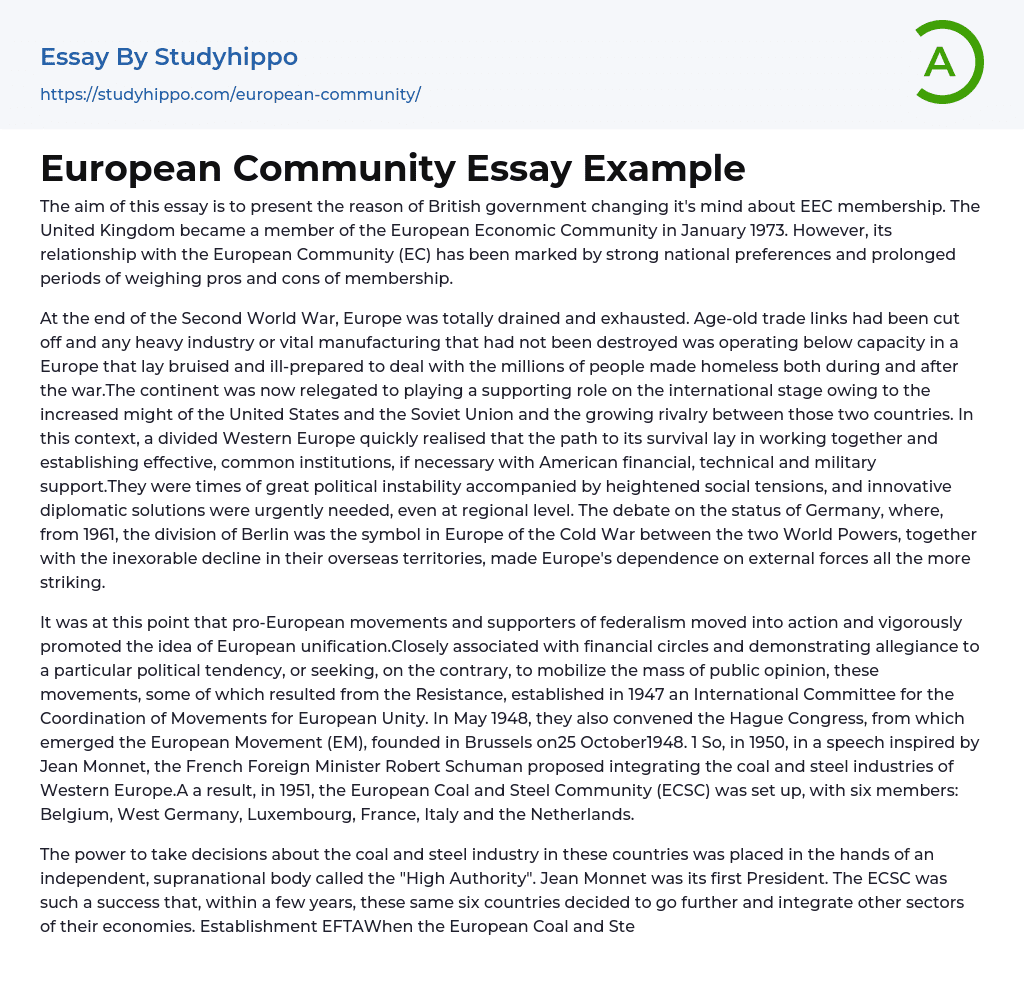The aim of this text is to explain why the British government altered their position on involvement in the EEC. Notwithstanding joining the European Economic Community in January 1973, the UK has always assessed pros and cons of membership from its individual national standpoint when engaging with the European Community.
After World War II, Europe was left in a state of exhaustion, with disrupted trade connections and damaged industries. The continent was weakened and unprepared to handle the millions of homeless individuals resulting from the war. As a result, Europe's role in the international arena was reduced and the United States and Soviet Union became more prominent with increasing rivalry. Divided Western Europe recognized that survival meant working together to establish effective institutions, possibly through American financial, technical, and military support. These times were marked by political instabili
...ty and social tensions, requiring innovative diplomatic solutions even at a regional level. The ongoing debate over Germany's status, epitomized by the division of Berlin after 1961, and the decline of overseas territories increased Europe's dependence on external forces.
In 1947, the International Committee for the Coordination of Movements for European Unity was established by pro-European movements and federalism supporters who were closely linked with financial circles and aligned with a specific political ideology, with the goal of mobilizing public opinion. They formed this committee as a result of the Resistance, and in May 1948, they organized the Hague Congress, where the European Movement (EM) was founded in Brussels on October 25th of that same year. In 1950, inspired by Jean Monnet, French Foreign Minister Robert Schuman proposed integrating the western European coal and steel industries in a speech. Consequently,
the European Coal and Steel Community (ECSC) was founded in 1951 with six member countries: Belgium, West Germany, Luxembourg, France, Italy and the Netherlands.
The "High Authority", an independent, supranational entity led by Jean Monnet as its first President, was given the power to make decisions regarding the coal and steel industries in the countries involved. The success of the ECSC prompted these six nations to expand their integration efforts to encompass additional economic sectors. Although established in the 1950s, Britain did not participate in the ECSC at that time due to political and economic factors.
Both the British elite and electorate disregarded the supranational aspect of the Community and considered European affairs unimportant to the public. They feared that joining could damage Britain's strong trade relationships with Commonwealth nations. Despite being economically stronger than much of Europe during the late 1940s and early 1950s, integrating with unstable nations offered few benefits. Additionally, membership had potential risks for Britain's political connections with the United States.
As a rival to the European Economic Community, the United Kingdom formed its own European free trade area but opted not to participate. In 1959, Britain was one of eight nations that created the European Free Trade Association (EFTA) with the aim of opposing the EEC. The EFTA agreement removed tariffs on industrial goods between member states exclusively and did not implement a shared external tariff or cover agricultural products. Furthermore, members had the ability to withdraw at their discretion, rendering EFTA less impactful than the Common Market.
The reason for Britain's delayed participation in the European Communities can be traced back to the formation of the European Coal and Steel
Community (ECSC) in the 1950s. During this time, Clement Attlee's Labour government declined an invitation to join, resulting in significant consequences for Britain as they missed out on economic benefits. As their economy worsened and their global influence decreased, being excluded from such a crucial alliance became impossible to ignore. However, by 1961 it was clear that remaining outside of the EEC would lead to political and economic isolation, leaving Britain with little power in Europe. Negotiations for EEC membership began under the Conservative Macmillan government who submitted an application for membership in August of that year influenced by various factors.
One reason for Britain's decision to leave EFTA was that while EFTA was meeting its limited expectations, it was not sufficiently countering the increasing importance of the EEC. This was evident both in the progress being made within the EEC and in the trade relationships between individual EFTA states and the EEC. Countries such as Austria and Switzerland, along with Britain itself, were trading more with the EEC than with other EFTA countries. Additionally, given that the EEC was moving quickly towards a full customs union, Britain felt it was necessary to protect its vital trade with the Community.
If the UK remains outside the external tariffs wall of the EEC, it will not receive compensation from EFTA. Additionally, the British government is evaluating its declining role and influence in global politics, especially concerning the United States and Commonwealth. With the expansion of the Commonwealth after decolonization, it has become evident that although Britain remains a dominant trade partner with most ex-colonies, it cannot maintain the same level of exclusive trading advantages as before.
- Berlin essays
- Pompeii essays
- Paris essays
- Athens essays
- Belgium essays
- England essays
- Germany essays
- Greece essays
- Ireland essays
- Italy essays
- London essays
- Russia essays
- Spain essays
- United Kingdom essays
- Great britain essays
- Rome essays
- British essays
- Birmingham essays
- Caste System essays
- Citizenship essays
- Civil Society essays
- Community essays
- Culture essays
- Deviance essays
- Discourse Community essays
- Female essays
- Filipino People essays
- Igbo People essays
- Indigenous Australians essays
- Indigenous Peoples essays
- Men essays
- Middle Class essays
- Minority Group essays
- Modern Society essays
- Popularity essays
- Social Control essays
- Social Institution essays
- Social Justice essays
- Social Norms essays
- Social Responsibility essays
- Socialization essays
- The nation essays
- Afghanistan essays
- Africa essays
- America essays
- Asia essays
- Australia essays
- Caribbean essays
- City essays
- Developing Country essays




